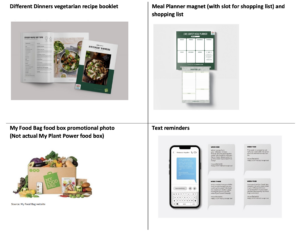By Rebecca Hayden, Jesse Allpress and Alison Reid
Introduction
Te Tāruke-ā-Tāwhiri / Auckland’s Climate Plan sets ambitious priorities to halve emissions by 2030, reach net zero emissions by 2050 and prepare for the impacts of climate change. One of the eight priority action areas within the plan is focused on food, and to develop ‘A low carbon, resilient, local food system that provides all Aucklanders with access to fresh and healthy food’.
There is strong evidence that increasing plant-based food choices leads to carbon emission reductions as well as delivering health and wellbeing benefits. For example, in 2019 the Eat Lancet Commission called for a significant change to the way people eat to try and address both the environmental and health impacts of food production and consumption. Their report outlined what a healthy diet that fits within planetary boundaries looks like – i.e. a plant-based or plant-forward, flexitarian diet.
As part of Auckland Council’s response to this action area, in 2022 the council’s Climate Action team partnered with the Research and Evaluation unit (RIMU) to develop an innovative research trial using behavioural insights. This goal of the Different Dinners trial was to support small changes toward choosing vegetarian dinners one or two more times per week.
The project built on learnings from previous research undertaken by PwC for the Climate Action team, which explored how Auckland Council could support Aucklanders to make more healthy, low carbon food choices that would contribute to reducing climate impacts of consumer decisions and to improve people’s health. That research included testing key behavioural insights with Aucklanders within a prototype online supermarket experience.
The PwC research found that dietary practices are complex, influenced by a mixture of factors including culture, taste preferences, cost, variety, convenience, and health. Several recommendations from that study were picked up in the design of the Different Dinners trial. They included:
- Focus on tastiness of non-meat options rather than environmental benefits
- Make it easier to try alternatives to frequently eaten meals
- Address unfamiliarity aversion and knowledge gap
- Create new habits.
It also found that people are more likely to eat meat at dinner time than other meals, so the focus of the Different Dinners trial was on dinner choices.
Project Design
The project was undertaken in 2022 and due to uncertainty about the impact of Omicron, the project team needed to design a project that could be fully delivered contactless.
The interventions were either based on established behavioural insights principles known to support and enable behaviour change, or they sought to address one or more known barriers to trying vegetarian dinners. They included:
- A recipe pack (consisting of booklet, fridge magnet meal planner, and shopping list)
- A one-off My Plant-Power food box from My Food Bag
- Text message reminder
- Commitment and plan.
These are shown below.

Participants were recruited via a baseline survey undertaken through the People’s Panel, Auckland Council’s online survey panel. A total of 3129 people responded to the survey, and of these, 732 people took part in the trial. Their participation was subject to certain criteria including eating meat for dinner five or more times a week and being willing to try eating one or two more vegetarian dinners per week.
Groups received different combinations of these interventions. The control group received nothing initially but were sent the recipe pack three to four weeks after the other participants received their interventions. Each group had more than 100 participants, as per the table below.

Results
The results demonstrate that many Aucklanders are willing to try eating less meat at dinner time, and did shift to more climate-friendly dietary choices as a result of the interventions.
All the interventions were successful to an extent.
At the start of the trial all participants reported an average of between 6.0 and 6.3 meat-containing dinners per week. There were no significant differences between the groups at this time point. After receiving their items, participants in all five intervention groups reported notable decreases in the number of meat-containing dinners eaten in the previous week. The decreases ranged between -0.9 and -1.2 meals per week. The changes in Groups 1 to 5 were greater than the change seen for Group 6 (control), which reported a decrease of -0.5 meat-containing dinners per week over the same period. Statistical analysis showed that these initial decreases in meat consumption for Groups 1 through 5 were significantly greater than Group 6.
Results also indicate that signing a commitment to reduce the number of meat-containing meals, and then making a plan for how to achieve this commitment, could result in greater long-term changes in behaviour.
Most participants said they really enjoyed the experience and were willing to and did continue preparing vegetarian meals more often, for example:
It has made a big difference!!!! We used lots of the meal ideas and felt really good after eating them!
Kept the food bag subscription going for a bit – was surprised how interesting the vegetarian options were, especially compared to their meat options. Will be trying to make an effort to eat less meat in the diet.
A significant barrier remains however for many who were keen on including more vegetarian dinners in their diet, and were trying to make changes, but found it challenging, or impossible, to influence the eating habits of others in their households:
My three teenagers just aren’t willing to embrace vegetarian meals no matter how hard I try.
A common sentiment among participants regarding what might help them to try more vegetarian meals in future was ‘do more of the same and improve on it’. People’s top suggestions included:
- Access to more recipes that are affordable, seasonal, easy, flavoursome and healthy.
- More recipes with less dairy, more protein, and more culturally appropriate foods.
Some suggested channels for delivering this could include online tools, weekly emails and more cookbooks.
Auckland Council Action
Building on the results of the Different Dinners project. Auckland Council’s Climate Action team is supporting four community-based EcoHubs to deliver their own behaviourally and locally informed climate action projects, focused on climate-friendly food choices.
Discussions are also underway about potential collaboration with other community-based organisations working in both the climate and health sectors.
Through Auckland Council’s Community Climate Action Fund there is an increasing number of applications from the community sector for funding to support plant-based cooking classes and engagement initiatives.
If you would like more information about the Different Dinners Trial please contact Rebecca Hayden via email: rebecca.hayden@aucklandcouncil.govt.nz or Alison Reid Team Manager Economic & Social Research & Eval,Research & Evaluation (RIMU) alison.reid@aucklandcouncil.govt.nz or Adrian Feasey Team Manager, Climate Action Solutions, Education & Community Climate Action (E&CCA) adrian.feasey@aucklandcouncil.govt.nz
The authors of this article worked alongside Alison Reid, Team Manager Economic and Social Research and Evaluation Unit (RIMU), Te Kaunihera o Tāmaki Makaurau, Auckland Council. Special thanks to Alison, who was integral in the evaluation of the qualitative data and supporting the finalisation of the report.
This article was edited by Lindsey Horne.



